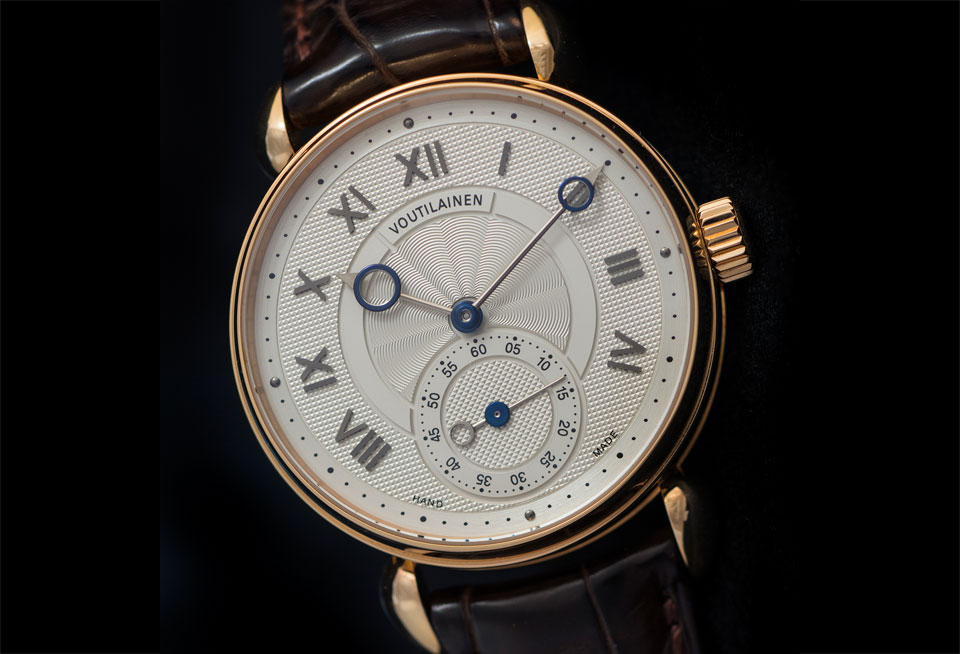Weekly Watch Photo – Voutilainen Observatoire

When it comes to classic and extremely desirable timepieces, Kari Voutilainen’s Observatoire is on the short list of many collectors. In today’s Weekly Watch Photo we show you an Observatoire and tell more about its (base) movement, the competition chronometer Peseux 260. The stunning photos are from Gary, the proud owner of this magnificent beauty.
Before we turn to the chronometry competitions and the Peseux caliber 260, let’s have a closer look at the dial. It’s a perfect example of a hand guilloché (engine turned) dial as can be found on all Voutilainen timepieces. Some of the few remaining Rose engine turning machines (click here for Wikipedia) that can be used for dials, can be found in Voutilainen’s atelier. Dials adorned by engine turning (or hand guilloché) are a rare commodity now-a-days, as the Rose engine turning machines and the skills required to use these machines properly are both becoming extremely rare. Lucky for those in the position to buy a Voutlainen, it comes with a bespoke hand guilloché dial.
Voutilainen became well known among collectors for his Observatoire, with a movement based on the chronometry competition caliber Peseux 260. The finishing of the movement and the legendary performance during the chronometry competitions, which took place between 1944 and 1967, all add to the desirability of the timepiece.

Competition chronometer-quality wristwatch movements are not “ordinary” C.O.S.C. certified movements. These movements were designed and finished to excel in the rigorous world of Observatory Competitions, as conducted in Geneve and Neuchatel in the years 1944 through 1967.
Chronometry Competition
Before one was allowed to enter the competition, the watch was tested, and those watches meeting the rigorous standards were awarded the certification, and were eligible for actual competition. The full test took 44 days, encompassing 5 positions, 3 temperatures and 9 periods of from 1 to 5 days. In order to receive certification a watch had to meet or surpass standards in 11 categories, ranging from “mean rate variation, each period” (1.5 seconds) through “mean rate variation with respect to position change” (3 seconds).
During the entire 23 years of testing, 5093 wristwatches were submitted for certification, and only 3253 were passed, about 64%. Just a few manufacturers participated, and only Omega and Patek did so every year. The others were: Rolex, Girard-Perregaux, Longines, Movado, Vacheron & Constantin, Ulysse Nardin, Zenith and Favre-Leuba, along with numerous independent professional watchmakers.
Peseux supplied an ebauche exclusively for the Competitions, which was caliber 260. Over the period of 23 years Peseux produced a little over 3300 movements. What’s an interesting fact is that these movement were sometimes bought by either manufactures and independent watchmakers. The manufactures chose caliber 260 as a base for their competition entry, while the independent watchmakers or adjusters (those who adjust and regulate a timepiece) bought such a movement to promote their own skills.
(source: SteveG’s Watch Launchpad)
The Peseux 260 is a beautiful movement, with all the best features for accurate and consistent running: a screw balance and a blued overcoil hairspring. While SteveG states the balance to be a Guillaume balance, fact as stated here (background info) indicate that it is not such a Guillaume balance wheel and that might just be a good thing.
Voutilainen’s finish is both technically and aesthetically of the highest possible level. Hand beveled edges of the bridges, Côte de Genève striping done by hand, polished screw heads, angled and polished screw holes, hand angled and polished gear spokes and of course perlage (circular spotting) on the main plate and non-visible parts.

While Voutilainen doesn’t use the Peseux 260 caliber anymore, his brilliant skills of finishing and the bespoke hand guilloché dials are now-a-days combined with Voutilainen’s in-house designed, manufactured, finished and assembled movement, caliber Vingt-8, which we discussed here.
Thanks to Gary G, for letting me use his beautiful photos!



